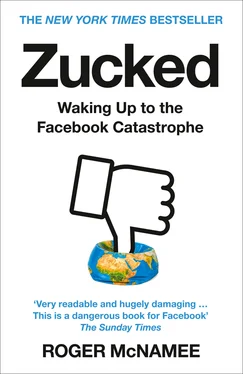The second important change was philosophical. American business philosophy was becoming more and more proudly libertarian, nowhere more so than in Silicon Valley. The United States had beaten the Depression and won World War II through collective action. As a country, we subordinated the individual to the collective good, and it worked really well. When the Second World War ended, the US economy prospered by rebuilding the rest of the world. Among the many peacetime benefits was the emergence of a prosperous middle class. Tax rates were high, but few people complained. Collective action enabled the country to build the best public education system in the world, as well as the interstate highway system, and to send men to the moon. The average American enjoyed an exceptionally high standard of living.
Then came the 1973 oil crisis, when the Organization of Petroleum Exporting Countries initiated a boycott of countries that supported Israel in the Yom Kippur War. The oil embargo exposed a flaw in the US economy: it was built on cheap oil. The country had lived beyond its means for most of the sixties, borrowing aggressively to pay for the war in Vietnam and the Great Society social programs, which made it vulnerable. When rising oil prices triggered inflation and economic stagnation, the country transitioned into a new philosophical regime.
The winner was libertarianism, which prioritized the individual over the collective good. It might be framed as “you are responsible only for yourself.” As the opposite of collectivism, libertarianism is a philosophy that can trace its roots to the frontier years of the American West. In the modern context, it is closely tied to the belief that markets are always the best way to allocate resources. Under libertarianism, no one needs to feel guilty about ambition or greed. Disruption can be a strategy, not just a consequence. You can imagine how attractive a philosophy that absolves practitioners of responsibility for the impact of their actions on others would be to entrepreneurs and investors in Silicon Valley. They embraced it. You could be a hacker, a rebel against authority, and people would reward you for it. Unstated was the leverage the philosophy conferred on those who started with advantages. The well-born and lucky could attribute their success to hard work and talent, while blaming the less advantaged for not working hard enough or being untalented. Many libertarian entrepreneurs brag about the “meritocracy” inside their companies. Meritocracy sounds like a great thing, but in practice there are serious issues with Silicon Valley’s version of it. If contributions to corporate success define merit when a company is small and has a homogeneous employee base, then meritocracy will encourage the hiring of people with similar backgrounds and experience. If the company is not careful, this will lead to a homogeneous workforce as the company grows. For internet platforms, this means an employee base consisting overwhelmingly of white and Asian males in their twenties and thirties. This can have an impact on product design. For example, Google’s facial-recognition software had problems recognizing people of color, possibly reflecting a lack of diversity in the development team. Homogeneity narrows the range of acceptable ideas and, in the case of Facebook, may have contributed to a work environment that emphasizes conformity. The extraordinary lack of diversity in Silicon Valley may reflect the pervasive embrace of libertarian philosophy. Zuck’s early investor and mentor Peter Thiel is an outspoken advocate for libertarian values.
The third big change was economic, and it was a natural extension of libertarian philosophy. Neoliberalism stipulated that markets should replace government as the rule setter for economic activity. President Ronald Reagan framed neoliberalism with his assertion that “government is not the solution to our problem; it is the problem.” Beginning in 1981, the Reagan administration began removing regulations on business. He restored confidence, which unleashed a big increase in investment and economic activity. By 1982, Wall Street bought into the idea, and stocks began to rise. Reagan called it Morning in America. The problems—stagnant wages, income inequality, and a decline in startup activity outside of tech—did not emerge until the late nineties.
Deregulation generally favored incumbents at the expense of startups. New company formation, which had peaked in 1977, has been in decline ever since. The exception was Silicon Valley, where large companies struggled to keep up with rapidly evolving technologies, creating opportunities for startups. The startup economy in the early eighties was tiny but vibrant. It grew with the PC industry, exploded in the nineties, and peaked in 2000 at $120 billion, before declining by 87 percent over two years. The lean startup model collapsed the cost of startups, such that the number of new companies rebounded very quickly. According to the National Venture Capital Association, venture funding recovered to seventy-nine billion dollars in 2015 on 10,463 deals, more than twice the number funded in 2008. The market power of Facebook, Google, Amazon, and Apple has altered the behavior of investors and entrepreneurs, forcing startups to sell out early to one of the giants or crowd into smaller and less attractive opportunities.
Under Reagan, the country also revised its view of corporate power. The Founding Fathers associated monopoly with monarchy and took steps to ensure that economic power would be widely distributed. There were ebbs and flows as the country adjusted to the industrial revolution, mechanization, technology, world wars, and globalization, but until 1981, the prevailing view was that there should be limits to the concentration of economic power and wealth. The Reagan Revolution embraced the notion that the concentration of economic power was not a problem so long as it did not lead to higher prices for consumers. Again, Silicon Valley profited from laissez-faire economics.
Technology markets are not monopolies by nature. That said, every generation has had dominant players: IBM in mainframes, Digital Equipment in minicomputers, Microsoft and Intel in PCs, Cisco in data networking, Oracle in enterprise software, and Google on the internet. The argument against monopolies in technology is that major innovations almost always come from new players. If you stifle the rise of new companies, innovation may suffer.
Before the internet, the dominant tech companies sold foundational technologies for the architecture of their period. With the exception of Digital Equipment, all of the tech market leaders of the past still exist today, though none could prevent their markets from maturing, peaking, and losing ground to subsequent generations. In two cases, IBM and Microsoft, the business practices that led to success eventually caught the eye of antitrust regulators, resulting in regulatory actions that restored competitive balance. Without the IBM antitrust case, there likely would have been no Microsoft. Without the Microsoft case, it is hard to imagine Google succeeding as it did. Beginning with Google, the most successful technology companies sat on top of stacks created by others, which allowed them to move faster than any market leaders before them. Google, Facebook, and others also broke the mold by adopting advertising business models, which meant their products were free to use, eliminating another form of friction and protecting them from antitrust regulation. They rode the wave of wired broadband adoption and then 4G mobile to achieve global scale in what seemed like the blink of an eye. Their products enjoyed network effects, which occur when the value of a product increases as you add users to the network. Network effects were supposed to benefit users. In the cases of Facebook and Google, that was true for a time, but eventually the value increase shifted decisively to the benefit of owners of the network, creating insurmountable barriers to entry. Facebook and Google, as well as Amazon, quickly amassed economic power on a scale not seen since the days of Standard Oil one hundred years earlier. In an essay on Medium, the venture capitalist James Currier pointed out that the key to success in the internet platform business is network effects and Facebook enjoyed more of them than any other company in history. He said, “To date, we’ve actually identified that Facebook has built no less than six of the thirteen known network effects to create defensibility and value, like a castle with six concentric layers of walls. Facebook’s walls grow higher all the time, and on top of them Facebook has fortified itself with all three of the other known defensibilities in the internet age: brand, scale, and embedding.”
Читать дальше






